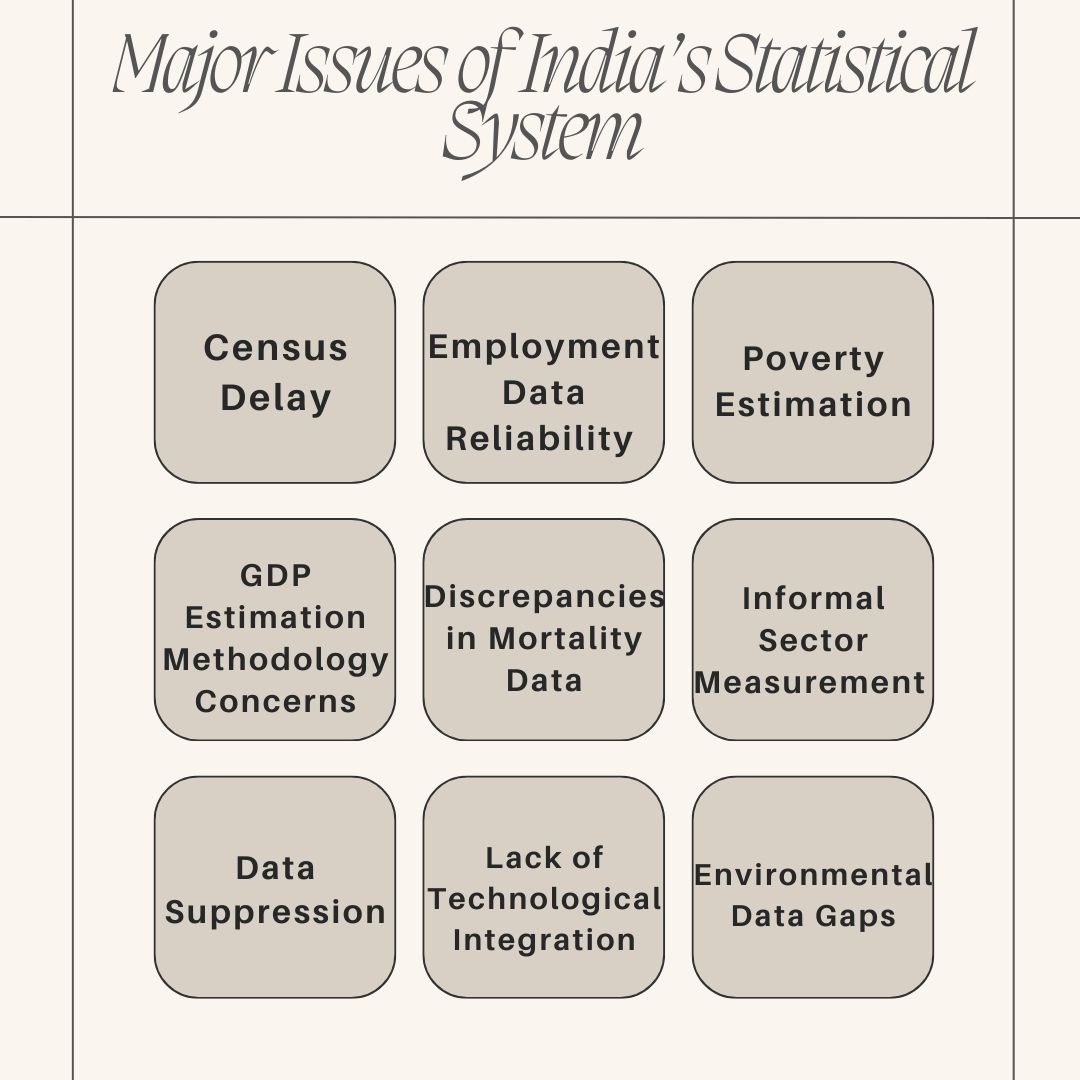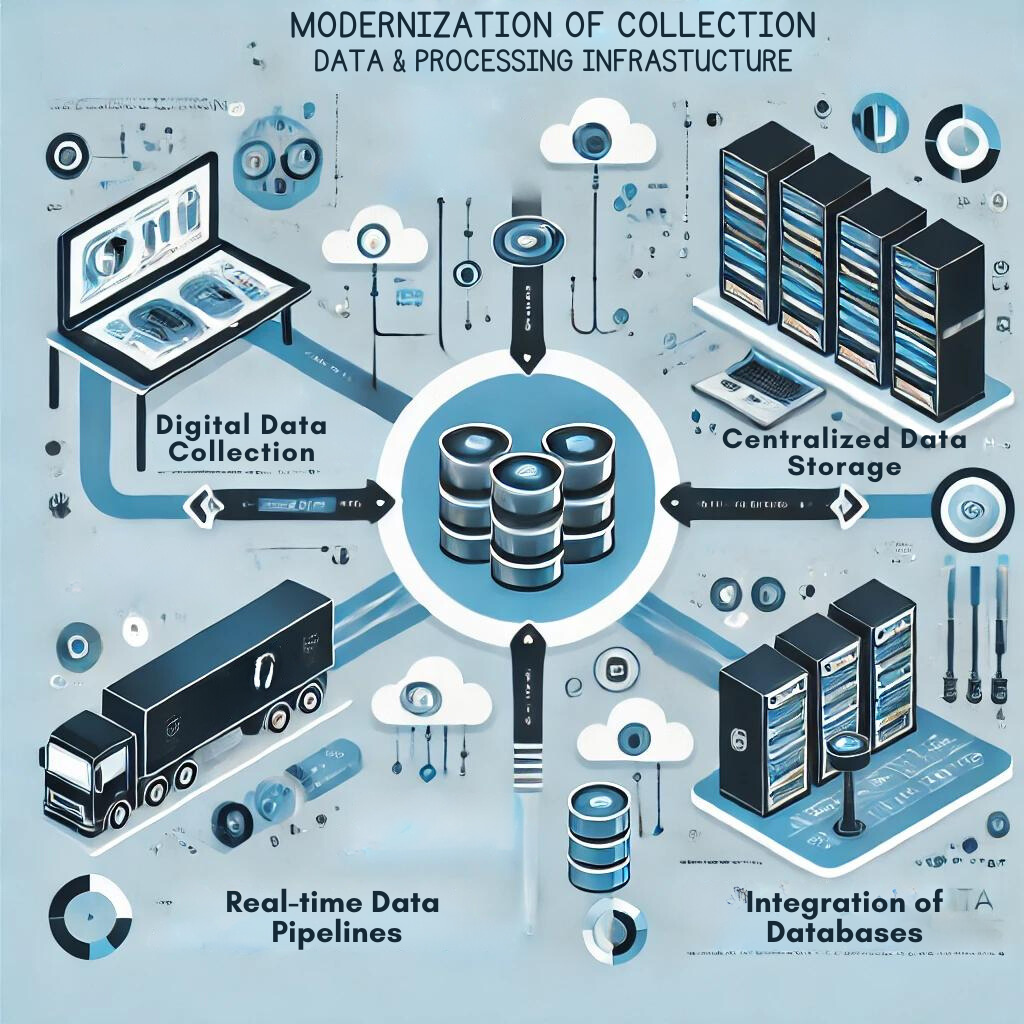The statistical system in India is scrutinized due to concerns about data quality and methodology, especially in light of recent debates on the National Sample Survey Office’s (NSSO) data. While these concerns may not be statistically validated, they highlight the urgent need for India to update its statistical methods to align with global standards. Modernizing these practices is essential for providing accurate, timely data to policymakers for informed decision-making in a rapidly evolving socio-economic landscape.
Origin of the Article
This editorial is based on “Official Statistical System in India,” published in The Hindu on 12/07/2024. The article critically assesses India’s statistical data quality, scrutinizing methodology and international standards’ applicability.
Relevancy for UPSC Students
Understanding the robustness and limitations of India’s statistical system is crucial for UPSC aspirants. It relates to GS Paper 1 and GS Paper 2, covering Population and Associated Issues and Government Policies & Interventions. Insights gained will help in essay writing, policy analysis, and understanding governance-related challenges.

Why in News
The topic is in the news due to recent debates questioning the quality of India’s official statistics, particularly from the National Sample Survey Office (NSSO). These concerns underscore the need for modernizing India’s statistical methodologies to align with global standards, a crucial aspect for UPSC aspirants who must understand the implications on policy-making and governance. Past UPSC questions, such as those on population density and growth rates, highlight the importance of credible data in framing accurate socio-economic indicators.
Current Statistical Framework in India
India’s statistical framework is a complex system managed by both central and state government bodies. The framework ensures data collection, analysis, and dissemination, which is crucial for informed policy-making and governance. The Ministry of Statistics and Programme Implementation (MoSPI) is the central nodal agency, coordinating with various entities to maintain an integrated statistical system.
Central Government
Ministry of Statistics and Programme Implementation (MoSPI)
MoSPI is the central nodal agency responsible for the official statistics system in India. It plays a pivotal role in coordinating statistical activities across various government departments and ensuring the accuracy and reliability of data.
National Statistics Office (NSO)
NSO oversees the integrated development of the national statistical system under MoSPI. It ensures that statistical data collected from various sources is standardized and reliable.
Central Statistics Office (CSO) & National Sample Survey Office (NSSO)
CSO and NSSO are integral parts of NSO. CSO handles macroeconomic statistics, while NSSO conducts large-scale surveys to gather data on various socio-economic indicators.
Line Ministries/Departments
Various line ministries and departments have their statistical establishments. They are responsible for collecting, disseminating, and coordinating data with NSO, ensuring that sector-specific statistics are accurate and timely.
State Government
Directorates of Economics & Statistics (DES)
In states, the DES coordinates statistical activities. These directorates ensure that data collection and analysis are consistent with national standards, contributing to a cohesive national statistical system.
Data Collection and Contribution
States are crucial in data collection and processing. They compile sector-specific data, which is then integrated into national statistics, ensuring that state-level variations are accurately represented.
National Statistical Commission (NSC)
Establishment and Role
Established in 2006, NSC serves as the apex advisory body on statistical matters. It was set up based on recommendations from the C. Rangarajan Commission to enhance the credibility and reliability of India’s statistical system.
Placement in Seventh Schedule
‘Statistics’ is included under Entry 94 (Union List) and Entry 45 (Concurrent List) in the Seventh Schedule of the Indian Constitution. This dual placement ensures both central and state governments play a role in statistical activities.
Legislative Framework
The legislative framework governing statistics in India includes the Census Act, 1948; the Registration of Births and Deaths Act, 1969; and the Collection of Statistics Act, 2008. These acts provide the legal basis for various statistical activities.
Major Issues Related to India’s Statistical System
India’s statistical system faces several critical issues, from outdated methodologies to data suppression. These problems undermine the credibility and reliability of statistical data, affecting policy-making and governance.

Census Delay and Its Implications
Policy Distortions
Delays in the census can lead to outdated demographic data, causing misaligned policies. For example, education planning based on old population figures can underestimate current needs in rapidly growing areas.
Economic Miscalculations
Census delays also affect state-wise poverty ratios and tax sharing between the Centre and states. States with high population growth may be underfunded based on decade-old data.
GDP Estimation Methodology Concerns
India’s GDP estimation methods have faced scrutiny for potential overestimation. For instance, the 2015 revision raised the GDP growth rate for 2013-14, leading to skepticism about its accuracy.
Employment Data Reliability and Frequency
The discontinuation of comprehensive Employment-Unemployment Surveys by NSSO created significant data gaps. The Periodic Labour Force Survey (PLFS) introduced later faced criticism for its methodological changes.
Poverty Estimation Challenges
The government has not released official poverty estimates since 2011-12 due to methodological debates. Different methodologies suggested by the Tendulkar and Rangarajan Committees have led to varying estimates.
Discrepancies in Mortality Data during COVID-19
The COVID-19 pandemic highlighted significant gaps in India’s death registration system. WHO estimates significantly differed from official counts, pointing to issues in death registration and reporting.
Informal Sector Measurement Challenges
India’s large informal sector poses measurement challenges. The last Economic Census was conducted in 2013–14, and the latest one is yet to be released, affecting policy formulation for this crucial sector.
Data Suppression and Delayed Releases
Instances of withholding unfavorable statistical reports, like the NSSO’s 2017-18 consumption expenditure survey, raise questions about the independence and transparency of statistical system in India.
Lack of Technological Integration and Big Data Utilization
Despite initiatives like Digital India, the integration of big data and advanced analytics in official statistics remains limited. The potential of GST data and digital transactions is largely untapped.
Environmental Data Gaps
India lacks comprehensive, regularly updated environmental statistics. The last ground-truthing forest survey was conducted in the 1980s, affecting the accuracy of forest cover estimates and climate policy.
Measures to Strengthen the Statistical System in India
Reforms are essential to enhancing India’s statistical system. These measures aim to improve data accuracy, transparency, and timeliness, ensuring that policymakers have reliable information for decision-making.
Comprehensive Legal and Institutional Reforms
New Statistical Act
A new Statistical Act should replace the outdated Collection of Statistics Act. This will ensure that statistical agencies have the authority to release data without political interference.
Autonomy of Statistical Agencies
Strengthening the autonomy of statistical agencies like NSSO through legislative reforms is crucial. This will ensure data integrity and reliability.
National Statistical Service
Streamlining the recruitment and career progression of statisticians across government departments will enhance the efficiency and effectiveness of the statistical system.
Independent Regulatory Body
Establishing an independent regulatory body to oversee data quality and methodological standards will ensure the credibility of official statistics.
Modernization of Data Collection and Processing Infrastructure
Digital Data Collection
Implementing a nationwide digital data collection system will replace paper-based surveys, enhancing data accuracy and timeliness.
Centralized Data Storage
A centralized, cloud-based data storage and processing infrastructure will ensure robust security and easy access to data.
Integration of Databases
Integrating various administrative databases will provide comprehensive and frequent data updates, improving the overall statistical system.
Real-time Data Pipelines
Establishing real-time data pipelines for key economic indicators will enable timely economic monitoring and decision-making.

Capacity Building and Skill Enhancement
Statistical Training Institute
Creating a dedicated Statistical Training Institute will ensure continuous upskilling of government statisticians, enhancing their capabilities.
Global Partnerships
Developing partnerships with leading global statistical organizations and universities will facilitate knowledge exchange and the adoption of best practices.
Statistical Literacy Program
Implementing a mandatory statistical literacy program for government officials involved in policy-making will improve their understanding and use of statistical data.
Enhanced Data Transparency and Accessibility
National Data Portal
Developing a user-friendly National Data Portal will provide easy access to all official statistics, ensuring transparency.
Pre-announced Calendar
Implementing a pre-announced calendar for major statistical releases will ensure predictability and reduce speculation.
Public Consultation
Establishing a public consultation process for major methodological changes will enhance the credibility of the statistical system.
Strengthening Subnational Statistical Capabilities
State Statistical Innovation Funds
Creating State Statistical Innovation Funds will encourage the modernization of state-level statistical systems.
Ranking System
Implementing a ranking system for state statistical capabilities will foster healthy competition and improvements.
Regional Data Processing Centers
Establishing regional data processing centers will support smaller states and union territories, enhancing their statistical capabilities.
Blockchain and Distributed Ledger Technology
Immutable Audit Trail
Implementing blockchain for maintaining an immutable audit trail will ensure data integrity and transparency.
Smart Contracts
Using smart contracts for automated data-sharing agreements will enhance the efficiency of data sharing between government departments.
Secure Surveys
A blockchain-based system for household surveys will ensure data integrity from collection to publication.
Big Data Analytics and Alternative Data Sources
Developing methodologies to incorporate big data sources into official statistics will enhance the accuracy and timeliness of data.
Reforming Census and Sample Survey Systems
Rolling Census Model
Implementing a rolling census model will provide continuous data collection, enhancing the timeliness and accuracy of demographic data.
Master Sample Frame
Developing an annually updated master sample frame for household surveys will ensure that surveys are based on the latest data.
Adaptive Survey Designs
Introducing adaptive survey designs that adjust sample sizes based on real-time data quality indicators will improve the accuracy and reliability of survey data.
PESTEL Analysis
| Political: The statistical system in India is tightly intertwined with political influences, evident from the delayed census and the suppression of unfavorable reports. The government’s role is crucial in enacting new laws such as a proposed Statistical Act to enhance transparency and autonomy in data handling. Economic: Accurate statistical data is vital for sound economic policy-making. Current gaps in employment and poverty data, as well as potential GDP overestimation, can lead to economic miscalculations affecting policy and resource allocation. Modernizing data collection and processing can provide more reliable data for economic decisions. Social: Societal trust in official statistics may be eroded due to perceived inaccuracies and data suppression. Public consultations and enhanced statistical literacy can help rebuild trust and ensure societal acceptance of statistical data. Technological: Technological advancements are not sufficiently integrated within the current statistical framework. The adoption of digital data collection, big data analytics, and blockchain for data integrity is crucial for aligning India’s statistical system with global standards. Environmental: The report highlights significant gaps in environmental data, which is critical for addressing India’s environmental challenges and policy planning. Regular updates and accurate environmental statistics are necessary for effective environmental management and policy-making. Legal: Legal frameworks such as the Census Act and the Collection of Statistics Act govern data collection and dissemination. Updating these laws and introducing new legislation focused on data protection and technological integration will provide a robust legal backbone for the statistical system. |
Conclusion
In conclusion, the modernization of the statistical system in India is not just a technical necessity but a strategic imperative for informed governance. As future policymakers, UPSC aspirants must recognize the importance of reliable data in shaping effective policies. Embracing innovative methodologies and ensuring transparency will pave the way for a robust statistical framework, essential for India’s socio-economic progress.
| UPSC Civil Services Examination, Previous Year Questions (PYQs) Mains Q. Discuss the challenges faced by India’s official statistical system. What measures would you suggest to modernize and improve the credibility of India’s statistical data? (GS Paper III, 2015). Q. Analyze the recent debates regarding the sample design and data quality of the National Sample Survey Office (NSSO) data. Discuss the implications of these concerns on the credibility of India’s statistical data and suggest ways to enhance data quality and reliability. |

